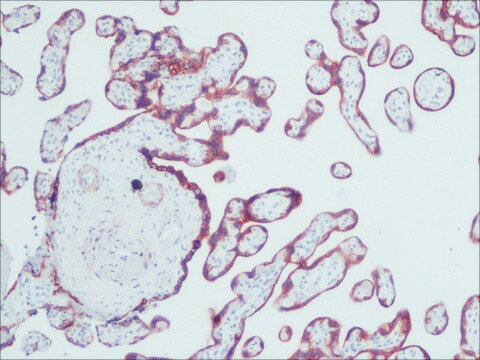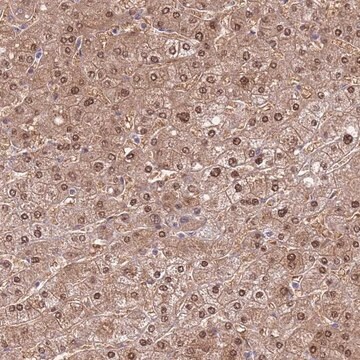推荐产品
生物源
mouse
品質等級
抗體表格
purified antibody
抗體產品種類
primary antibodies
無性繁殖
AE1/AE3, monoclonal
物種活性
human
製造商/商標名
Chemicon®
IHC Select
技術
immunohistochemistry: suitable (paraffin)
同型
IgG1
運輸包裝
wet ice
目標翻譯後修改
unmodified
基因資訊
human ... KRT1(3848)
一般說明
Keratins are a group of water-insoluble proteins that form monofilaments, a class of intermediate filament. These filaments form part of the cytoskeletal complex in epidermis and in most other epithelial tissues. Nineteen human epithelial keratins are resolved with two-dimensional gels electrophoresis (Moll, R., 1982). These can be divided into acid (pI <5.7) and basic (pI >6.0) subfamilies. The acidic keratins have molecular weights of 56.5, 55, 51, 50, 50′, 48, 46, 45, and 40 kD. The basic keratins have molecular weights of 65-67, 64, 59, 58, 56, and 52 kD. Members of the acidic and basic subfamilies are found together in pairs. The composition of keratin pairs varies with the epithelial cell type, stage of differentiation, cellular growth environment, and disease state (Sun, T.T., 1984; Cooper, D., 1985; Sun, T. T., 1985 ). The 56.5/65-67 kD pair is present in keratinized (differentiated) epidermis. The 55/64 kD pair is characteristic of normal (corneal-type) epithelial differentiation (Moll, R., 1982; Sun, T.T, 1984). The 51/59 kD pair is characteristic of the stratified squamous epithelial of internal organism such as esophagus and tongue (Moll, R., 1982; Cooper, D., 1985). The 51/58 kD pair is a keratinocyte marker; this pair is present in almost all stratified epithelia irrespective of the state of cellular stratification (Moll, R., 1982; Sun, T.T., 1984). The 48/56 kD pair is characteristic of hyper-proliferative (de-differentiated) keratinocytes (Moll, R., 1982; Weiss, R.A., 1984). The 45/52 kD pair and to a lesser extent, the 46/54 kD pair are characteristic of simple epithelia (Moll, R., 1982). The 40 kD keratin is present in most epithelia except adult epidermis (Moll, R., 1982).
特異性
Anti-Keratin AE1 recognizes the 56.5, 50, 50′, 48, and 40 kD keratins of the acidic subfamily. Anti-keratin AE3 recognizes all members of the basic subfamily. AE1/AE3 reacts with both acidic and basic keratins. Staining is localized to the cytoplasm. AE1/AE3 specifically binds to antigens located in the cytoplasm of normal epithelia. Reacts with cells of epithelial origin including simple and stratified epithelia and epidermis.
免疫原
Human epidermal keratin
應用
Antibody is prediluted and ready to use for Immunohistochemistry of formalin-fixed, paraffin-embedded tissues.
Pretreatment: Heat Induced Epitope Retrieval (HIER). Recommend Citrate Buffer, pH 6.0 (Cat. No. 21545). No signal was detected without Epitope retrieval.
Incubation: 10 minutes with IHC Select Detection Kits.
Cytokeratin AE1/AE3 has been prediluted for use as the primary antibody with Chemicon′s IHC Select Detection Kits and Protocols (Catalog Nos. DAB050, DET-HP1000, APR050, and DET-APR1000), but other supplier′s IHC detection systems may be used. For optimized protocol details, visit www.chemicon.com and select the protocols link under Cat. No.IHCR2025-6.
Pretreatment: Heat Induced Epitope Retrieval (HIER). Recommend Citrate Buffer, pH 6.0 (Cat. No. 21545). No signal was detected without Epitope retrieval.
Incubation: 10 minutes with IHC Select Detection Kits.
Cytokeratin AE1/AE3 has been prediluted for use as the primary antibody with Chemicon′s IHC Select Detection Kits and Protocols (Catalog Nos. DAB050, DET-HP1000, APR050, and DET-APR1000), but other supplier′s IHC detection systems may be used. For optimized protocol details, visit www.chemicon.com and select the protocols link under Cat. No.IHCR2025-6.
IHC Select Anti-Cytokeratin AE1/AE3 (Pan cytokeratins) Antibody, prediluted, clone AE1/AE3 is an antibody against Cytokeratin AE1/AE3 (Pan cytokeratins) for use in IH(P).
Research Category
Cell Structure
Cell Structure
Research Sub Category
Cytokeratins
Cytokeratins
外觀
Format: Purified
Purified monoclonal mouse antibody supplied in liquid format diluted in PBS, pH 7.2 with stabilizers, 0.2% Tween 20, and 0.1% Kathon as preservative.
儲存和穩定性
Maintain at 2-8°C . Refer to vial for expiration dating.
法律資訊
CHEMICON is a registered trademark of Merck KGaA, Darmstadt, Germany
免責聲明
Unless otherwise stated in our catalog or other company documentation accompanying the product(s), our products are intended for research use only and are not to be used for any other purpose, which includes but is not limited to, unauthorized commercial uses, in vitro diagnostic uses, ex vivo or in vivo therapeutic uses or any type of consumption or application to humans or animals.
未找到合适的产品?
试试我们的产品选型工具.
訊號詞
Warning
危險聲明
危險分類
Aquatic Chronic 3 - Skin Sens. 1
儲存類別代碼
12 - Non Combustible Liquids
水污染物質分類(WGK)
WGK 2
閃點(°F)
Not applicable
閃點(°C)
Not applicable
Cindy Perez-Pacheco et al.
Clinical cancer research : an official journal of the American Association for Cancer Research, 29(13), 2501-2512 (2023-04-12)
Perineural invasion (PNI) in oral cavity squamous cell carcinoma (OSCC) is associated with poor survival. Because of the risk of recurrence, patients with PNI receive additional therapies after surgical resection. Mechanistic studies have shown that nerves in the tumor microenvironment
Ligia B Schmitd et al.
Neoplasia (New York, N.Y.), 20(7), 657-667 (2018-05-26)
A diagnosis of perineural invasion (PNI), defined as cancer within or surrounding at least 33% of the nerve, leads to selection of aggressive treatment in squamous cell carcinoma (SCC). Recent mechanistic studies show that cancer and nerves interact prior to
Jing Kong et al.
Cell communication & adhesion, 24(1), 11-18 (2018-05-08)
Salivary gland adenoid cystic carcinoma (SACC) is one of the most common malignancies in the oral and maxillofacial region. Carcinoma-associated fibroblast (CAF) is an important component in the tumor microenvironment and participates in SACC progression. In this study, we established
Christina Springstead Scanlon et al.
Nature communications, 6, 6885-6885 (2015-04-29)
Perineural invasion (PNI) is an indicator of poor survival in multiple cancers. Unfortunately, there is no targeted treatment for PNI since the molecular mechanisms are largely unknown. PNI is an active process, suggesting that cancer cells communicate with nerves. However
我们的科学家团队拥有各种研究领域经验,包括生命科学、材料科学、化学合成、色谱、分析及许多其他领域.
联系技术服务部门









